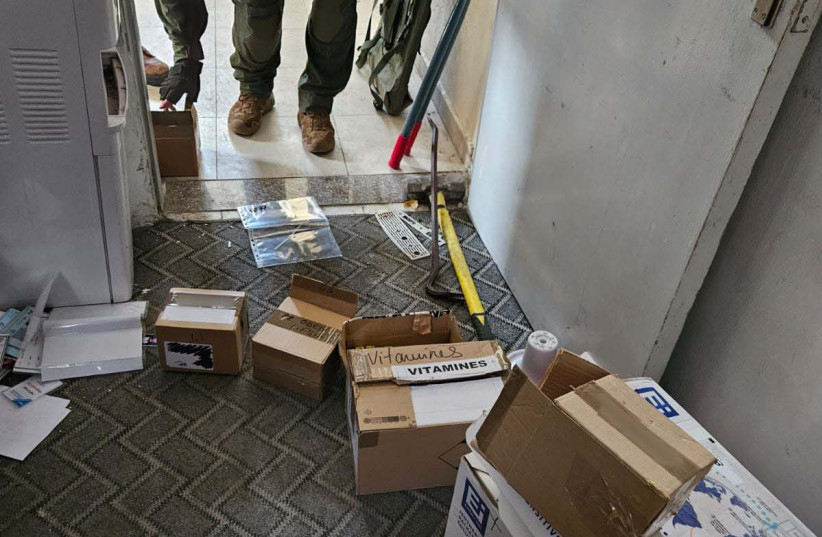The IDF Spokesperson’s Unit revealed on Sunday a pharmacy containing sealed packages of drugs that were transferred for the treatment of the hostages. Many of them suffer from chronic diseases and need daily care, without which their lives are in danger.
Maariv revealed the drugs identified from the videos, their nature, and the indications for which they are intended.
The medicines found by the IDF soldiers at the Nasser Hospital in Khan Yunis were closed and had not been used. Some of them were still enclosed in sealed brown boxes. On every medication box was the name of the hostage for whom it was intended. The IDF said that the source of the drugs and their use was under investigation.
The IDF operation was carried out by the commando forces, Shayetet 13, and other special forces, following intelligence information that indicated Hamas terror activity at the hospital. While searching the hospital area, Maglan fighters also located Hamas weapons, mortars, and grenades.

The IDF spokesperson obscured the drugs to prevent their association with the hostages. Maariv listed the drugs themselves and the indications for which they were intended.
The medication and its use
The first listed are multivitamins. These capsules contain a combination of the most necessary vitamins and minerals. They are usually used for treating malnutrition and allow the creation of a "safety net" that will prevent general medical deterioration in situations of starvation or lack of vitamins and minerals.
The list also has Hylo-Gel, gel eye drops that help treat dryness. They contain a high concentration of hyaluronic acid and improve the stability of the moisture layer in the eye, which is necessary for normal vision in those who suffer from various syndromes manifested in dry eyes.
Tritace is the next drug identified by Maariv. This drug is intended for the treatment of hypertension, heart failure, or chronic kidney failure. Its other name, "Ramipril," belongs to the group of drugs known as ACE, which, through a chain of inhibition processes, help increase cardiac output, reduce vascular resistance, and thus lower blood pressure and the excretion of sodium in urine. As is well known, some of the hostages suffer from high blood pressure, and any delay in treatment may cause a significant and life-threatening aggravation.
An additional drug is Amlodipine, a calcium channel blocker intended for the treatment of hypertension and angina pectoris. Blocking the sodium channels in the body results in a decrease in blood vessel resistance and a decrease in blood pressure. A delay in this drug may cause a significant increase in blood pressure, which may constitute a life-threatening risk.
Jardiance, a drug for the treatment of type 2 diabetes in adults, is also on the list. It contains Empagliflozin, which increases the excretion of glucose in the urine, reduces blood glucose levels, and thus helps to balance diabetes. This drug also contains metformin, which reduces the production of glucose in the liver and reduces the resistance of body cells to the hormone insulin, thus balancing diabetes. A delay in treatment causes a significant increase in sugar, a condition known as hyperglycemia, which in severe cases can also lead to loss of consciousness.
The penultimate drug mentioned is Ezecor, a drug designed to treat high levels of cholesterol in the blood by inhibiting its absorption in the intestines. It is usually given in combination with a statin class of drugs. Although the drug does not cause an immediate danger to life, a prolonged delay in treatment and an increase in blood lipid levels significantly increase the risk of a heart attack and stroke.
Zodorm is the last drug Maariv identified. It is used for treating insomnia. Many of the hostages described difficulty falling asleep at night, some of them remained awake for weeks with only a few minutes a day of sleep. Sleep deprivation not only causes fatigue but also increases the risk of endocrine disorders and high blood pressure, even in young people. The drug helps to fall asleep within about thirty minutes of taking it, and it is excreted in the urine within a few hours, so it usually does not cause fatigue the next morning.
